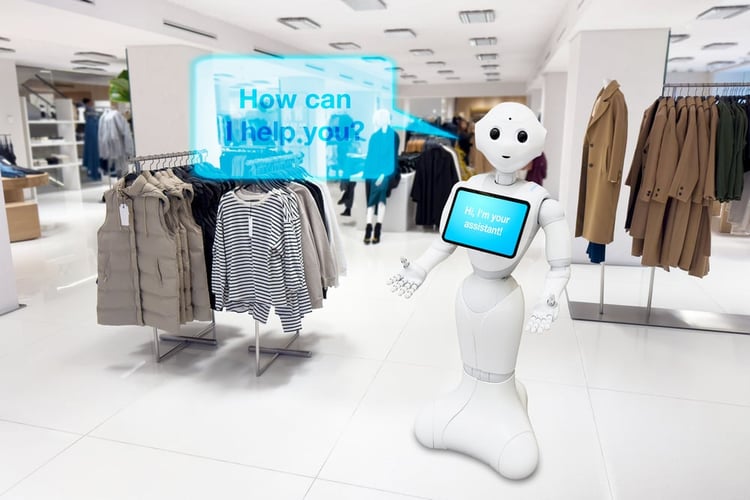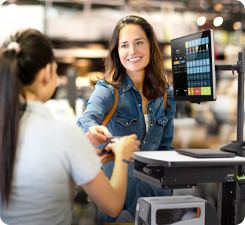
Technology continues to innovate various industries, but it doesn't come without a mixture of enthusiasm and fear. Businesses are understandably excited about the prospect of greater efficiency, while some workers worry they'll be replaced by robots.
Take the retail industry as a prime example. Who hasn't walked to the front of their local grocery or big box store recently and been confronted with the option to do self-checkout? Retail has experienced some major forms of automation over the past several years. But that doesn't necessarily mean all workers will be shown the door. But make no mistake, the future of retail careers will be vastly different than what we see today.
What's Happening With Automation in the Retail Sector?
 The retail industry, among others, has experienced many labor-related challenges over the past several years. In fact, the U.S. Department of Labor reports that frontline retail workers are expected to quit their jobs at double the rate of other workers.
The retail industry, among others, has experienced many labor-related challenges over the past several years. In fact, the U.S. Department of Labor reports that frontline retail workers are expected to quit their jobs at double the rate of other workers.
Many large retailers, like Home Depot, Walmart, and Kroger, have chosen to invest in automation to supplement some of their human labor. Self-checkout counters are just one example of retail automation. Another is AI-driven technology on the retail floor that helps shoppers find items as well as track customer behavior.
Behind the scenes, automation is streamlining the various logistics processes that bring products to retail shelves. For example, there are now automation solutions to count and put away inventory as well as prepare items for shipment to retail locations.
How Automation is a Positive Development for Retail Careers
While the shift to automation in the retail sector might seem alarming on the surface, the truth is that it's not all bad news for the human workers among us. For several years, the McKinsey Global Institute has been conducting extensive research on automation. They've discovered that about half of retail activities can be automated using current technology. However, only about 5% of all jobs can be fully automated.
Even with those figures, retail careers won't disappear. They'll just evolve and change. Here are some of the ways automation will result in different (and better) careers for retail workers.
1. Redefining Retail Careers
 Automation allows retail companies to create a variety of new retail career paths. As more retailers implement these solutions, there will be a greater demand for highly skilled workers in areas like robotics, data science, analytics, and more. These roles will empower workers to pursue positions that offer greater flexibility, higher wages, and better working conditions.
Automation allows retail companies to create a variety of new retail career paths. As more retailers implement these solutions, there will be a greater demand for highly skilled workers in areas like robotics, data science, analytics, and more. These roles will empower workers to pursue positions that offer greater flexibility, higher wages, and better working conditions.
2. Retraining the Workforce
To fill these new roles that automation will create in the retail industry, employers will need to support programs to retrain their workforce. In other words, the existing workers will have to learn new skills. McKinsey & Company recently surveyed 300 corporate executives of companies with over $100 in annual revenue. Of those, 82% agreed that businesses will need to retain their workforce to satisfy skills gaps in the future.
3. Lower-Stress Jobs
Retail is generally a high-stress job. And working through a labor shortage doesn't make things any easier. Existing workers are asked to work longer hours and take on more duties to compensate for shortages. This can cause worker dissatisfaction and burnout. Because automation results in greater efficiency, it also puts less strain on retail employees. Existing workers will be happier and more engaged, which can also result in high retention rates.
4. More Diversity of Tasks
Retail work can be incredibly repetitive, whether you are asking employees to work a checkout lane, bag groceries, stock shelves, or take inventory. One of the principal aims of automation is to eliminate or reduce those repetitive and tedious tasks. The work that is left are the sorts of tasks not suitable for automation, which tend to be more varied. Workers get to do a broader range of jobs during the day, which also makes the work more interesting.
5. Better Relationship-Building
 Most businesses achieve success based on quality relationships. When employees spend less time on repetitive and tedious tasks, they can devote more time to building better relationships — with everyone. Employees will have more time to devote to customer service. They will also build stronger ties with business partners and internal management.
Most businesses achieve success based on quality relationships. When employees spend less time on repetitive and tedious tasks, they can devote more time to building better relationships — with everyone. Employees will have more time to devote to customer service. They will also build stronger ties with business partners and internal management.
6. Informed and Empowered Workers
In addition to self-checkout stations, automation can be used to improve communication with retail workers. Automated messages can be sent to workers about company news, promotions, or even safety issues. When employees are better informed, they are more empowered in the workplace.
7. Improved Product Knowledge
When workers are spending every moment being reactive due to staff shortages, they have more time to improve their product knowledge. This can be particularly useful for businesses that sell complex products, like electronics. When employees can become product experts, they can deliver a better customer experience.
8. More Satisfied Customers
Today's consumers have high expectations of the brands they support. While many consumers might seem to be suspicious of automation in a retail setting, they actually love the benefits it provides in terms of customer service. Specifically, automation allows employees to provide a more personalized customer experience.
Many retailers are still hesitant to invest in automation technologies, even though they deliver impressive rates of return. But more of what we're seeing in larger retailers is on the horizon. The good news is that the current labor market challenges provide retailers with an excellent opportunity to shift priorities toward automation and develop strategies to take better advantage of the skills their existing workforce brings to the table.

